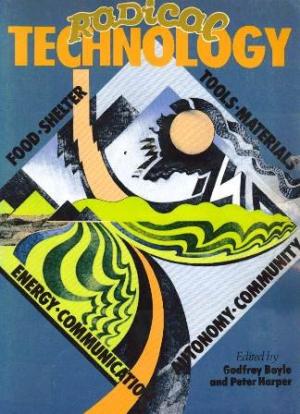
Book: "Radical Technology - Food and Shelter, Tools and Materials, Energy and Communications, Autonomy and Community" (1976). Edited by Godfrey Boyle and Peter Harper, and the editors of Undercurrents.
Summary[edit | edit source]
Radical Technology is a large-format, extensively illustrated collection of original articles concerning the reorganisation of technology along more humane, rational and ecologically sound lines. The many facets of such a reorganisation are reflected in the wide variety of contributions to the book. They cover both the hardware - the machines and technical methods themselves - and the 'software' - the social and political structures, the way people relate to each other and to their environment, and how they feel about it all.
The articles in the book range from detailed 'recipes' through general accounts of alternative technical methods, to critiques of current practices, and general proposals for reorganizations. Each author has been encouraged to follow her or his own personal approach, sometimes descriptive, sometimes analytic, sometimes technical, sometimes political. The contributors are all authorities in their fields.
The book is divided into seven sections (see below): Food, Energy, Shelter, Autonomy, Materials, Communication, Other Perspectives. Over forty separate articles include items on fish culture, small-scale water supply, biological energy sources, a definitive zoology of the windmill, selfhelp housing, building with subsoil, making car-type shoes, the economics of autonomous houses, what to look for in scrap yards, alternative radio networks, utopian communities, and technology in China. Between the main sections are interviews with prominent practitioners and theorists of Radical Technology, including John Todd of the New Alchemy Institute; Robert Jungk, author of Humanity 2000; the Street Farmers, a group of anarchist architects; Peter van Dresser, and Sietz Leefland, editor of Small Earth, the Dutch journal of alternative technology.
Also included between the main sections of the book is a series of visionary drawings by the gifted illustrator Clifford Harper, evoking the spirit and practice of Radical Technology: How it could be. These drawings, or 'visions' include a communalised urban garden layout; a household basement workshop; a community workshop; a community media centre; a collectivised terrace of urban houses; and an autonomous rural housing estate.
The book ends with a comprehensive directory of the literature and active organizations in Radical Technology. This notes inevitable gaps in the book's coverage, points the reader to where more information can be found, and provides also an overall picture of a growing movement.
Table of Contents[edit | edit source]
Food
Agribusiness / Charlie Clutterbuck -- Animal farm / John Seymour -- Compost culture / Lawrence D. Hills -- Biodynamic agriculture / H.H. Koepf and John Davy -- Food glorious food / John Shore -- A question of balance / Monica Hill -- Cut out the tripe / Tony Joyce -- After the goldfish / John Wood -- The answer lies in solution / J. Sholto Douglas -- Great pigs from little acorns grow / John Wood -- Across the hungry gap / John Seymour -- Each piece of land to each piece of sky / George Woolston -- Vision I : Collectivised garden / Clifford Harper -- Interview : John Todd / Patrick Rivers --
Energy
Plant your own power / Robert Vale -- Insulation / Brenda Vale -- Sunshine superpower / Robert Vale -- Natural, endless free / Derek Taylor -- Essentially co-operative energy / George Woolston -- Cast iron power / Kit Pedler -- Vision 2 : Basement workshop / Clifford Harper -- Interview : Sietz Leeflang / Godfrey Boyle --
Shelter
Lightweight / temporary / low-cost / quick / mobile / Stefan Szczelcun -- Folk building / Brenda Vale -- The ground over our heads / Colin Taylor -- Self help housing / Tom Wooley -- Man maketh the clothes / Chris Ryan -- Shoes / Nick Mellor -- Interview : Peter Van Dresser / Patrick Rivers -- Vision 3 : Autonomous village / Clifford Harper --
Autonomy
Limits of material autonomy ; Means of autonomy ; Variations on autonomy ; Family automony : Economics of autonomy : Collective autonomy ; Practical fantasies ; Conclusions / Peter Harper -- Vision 4 : Autonomous terrace / Clifford Harper -- Interview : Street farmers / Godfrey Boyle --
Materials
Rolling your own / Derek Burns -- Working the plank / Rob and Al Hitchings -- Skeptical chymist / Alan Dalton -- Any old iron / Robert and Al Hitchings -- De re metallica / Alan Stewart -- Vision 5 : Community workshop / Clifford Harper -- Interview : Robert Jungk / Tony Durham --
Communications
Hold the front page / Jonathan Zeitlyn -- Unfair exchange / Ian Morton -- R.T. Craft / Richard Elen, Cop McDonald -- Two-way mirror / Tom Picton -- There's no transport like no transport / Patrick Rivers -- Vision 6 : Community media centre / Clifford Harper --
Other perspectives
The moon in the mind / Lyn Gambles -- Inner technologies / Peter Russell -- It's been said before and where did that get us / Jos Kingston -- Escape route for the poor / Jimoh Omo-Fadakah -- Homespun philosophy / Satish Kumar -- Popular power 1970-73 / Josefina Mena -- Think big, think little / Tony Durham -- Bibliography and directory / Peter Harper.
Links[edit | edit source]
- If you want to read the original Radical Technology book, a slightly grainy microfiche version can be downloaded here.
- article in No Tech Magazine: "Radical Technology Revisited" (about Sept. 2016 conference)
- Book used on Amazon.com
- The Undercurrents Archive 1972 - 1984